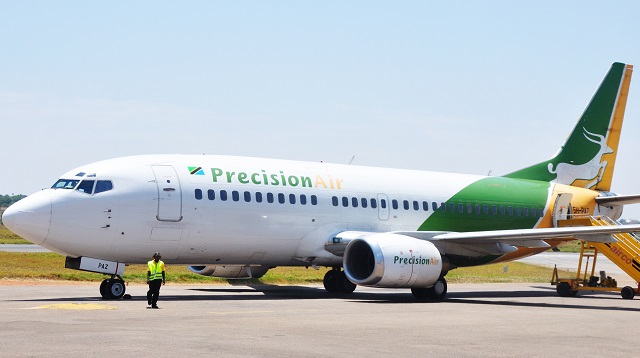
Precision Air was founded in 1993 and serves destinations across Tanzania, Kenya and Comoros
ANALYSIS | FELIX THOMPSON | Export Development Canada (EDC) has brought a claim in the UK High Court against an embattled Tanzanian airline company, alleging it is owed nearly US$26mn under an aircraft financing agreement.
In late 2012, the Canadian export credit agency (ECA) provided direct financing enabling Tanzanian aviation firm Precision Air to purchase two model 42-600 jets from French-Italian manufacturer ATR.
The deal was structured to involve a special purpose vehicle, Antelope Leasing, which acted as the borrower and held the aircraft as collateral on behalf of EDC.
Precision Air was obliged to make rental payments for the aircraft, and in time, the legal title for the planes was to be transferred to the airline once the loans were fully repaid.
But as revealed in filings made to the UK High Court in December, the Tanzanian company defaulted on its payments to EDC under the lease facility and has ignored multiple requests to pay since 2021.
EDC is seeking US$13mn under a leasing deal for the first aircraft, which covers unpaid rent of US$11.7mn and a termination sum of US$1.3mn.
For the second jet, EDC alleges it is due nearly US$11.3mn in unpaid rent and a termination payment of over US$1.6mn. In total, it aims to claw back nearly US$26mn.
In a financial statement signed and dated September 2022, the firm said the planes have largely been out of service, and the firm was in the process of “reviving the aircraft for returning to [the] lessor”.
“These aircraft were grounded since 2017 due to technical issues and they are not part of the active fleet,” it added.
An EDC spokesperson declined to comment when asked by GTR about the current location of the two ATR jets. “At this time, we are limited in what we can share,” they say.
Precision Air’s CEO and managing director, Patrick Mwanri, could not be reached for comment.
EDC’s support – typically cheaper than commercial bank financing – backed the sale of equipment by Pratt & Whitney, a North American engine manufacturer with facilities in Canada.
The deal also propped up a fleet modernisation programme at Precision Air, with the firm’s website still touting the fact it was the “first airline in the world” to operate the 42-600 model of ATR aircraft.
Precision Air was founded in 1993 and serves destinations across Tanzania, Kenya and Comoros. Today, it is partly owned by Kenya Airways, which holds a 41% stake.
In recent years, the East African firm has suffered from financial as well as reputational difficulties.
Two years ago, a Precision Air jet crashed into Lake Victoria, killing 19 people, with a Tanzania government report blaming the actions of the pilots and bad weather for the downing of the ATR aircraft.
The company’s finances were also hard hit by the Covid-19 pandemic as the wider group incurred a net loss of about Tsh45.1bn (approximately US$17.7mn) in the year up to December 2020, its latest accounts show.
“The group and company experienced significant losses for the past six years,” the firm says, while noting the effects of the Covid-19 crisis “crippled” its ability to keep up with the cost of maintaining equipment.
In the report, which is signed and dated September 2022, Precision Air says these events or conditions indicate a material uncertainty that may cast “significant doubt” on its ability to continue as a going concern.
The airline also admits it has struggled to pay off debts it took on to modernise and expand its pool of jets.
In 2008 – a few years before the EDC deal – the firm secured a US$127mn loan agreement with Citi and Finland’s development lender, Finnfund.
That transaction, which also involved a special purpose vehicle, Swala Leasing and Finance Limited, backed the purchase of seven ATR planes.
Precision Air said in its most recent financial statement it had been “in breach” of the terms of loan agreements with EDC, Citi and Finnfund due to “significant delays in repayments of principal and interest”.
ECAs have long played a crucial role in the aerospace sector given the high-value nature of the deals, yet agencies can be left exposed should borrowers run into financial strife.
In February 2023, Mexico’s Aeromar Airlines ceased all operations, citing sizeable financial losses and an inability to secure new, long-term investment. When it went under, the airline had stacked up debt worth a total of US$370mn, roughly half of which was owed to the Mexican government in unpaid tax as well as US$26.5mn due to Mexico City International Airport.
As reported by industry publication ch-aviation, EDC requested the Superior Court of Mexico seize three ATR planes from the now-bust Mexican regional airline in the weeks prior to its eventual demise.
Source: Global Trade Review
 The Independent Uganda: You get the Truth we Pay the Price
The Independent Uganda: You get the Truth we Pay the Price





